Expert's Rating
Pros
- Unblocks streaming services
- Super-affordable long-term plan
- Easy-to-use Windows app
Cons
- No WireGuard protocol
- Small server network
- Lacks advanced features
Our Verdict
PrivateVPN started out strong, but has since fallen off the pace. It’s still a good VPN for basic browsing and streaming purposes, but otherwise it lacks more modern features that users have come to expect.
PrivateVPN in brief:
- P2P allowed: Yes
- Device connections: 10 simultaneous device connections
- Business location: Sweden
- Number of servers: 200+
- Number of country locations: 63
- Cost: $9.99 per month, or $72 for three years
Sweden-based PrivateVPN’s catchphrase is “unlock anything, protect everything.” And that’s all most of us really want from a VPN. It’s a well-liked service with sterling user reviews and a bit of a charming underdog feel.
This simple and easy-to-use service made waves when it came into the market back in 2009. Since then it has maintained a dedicated following of users with a solid, if not comprehensive, lineup of features. It’s also one of the highest rated services on Trustpilot with thousands of reviews, so that many users must be onto something, right?
Further reading: See our roundup of the best VPN services to learn about competing products.
What are PrivateVPN’s features and services?
When you first open up PrivateVPN’s Windows client, you’ll notice that it offers two basic interface modes: Simple and Advanced. When you first start the app, it will automatically default to simple mode. It’s composed of a small single-pane window with a large Connect/Disconnect button in the center. Below that is a location tile and the option to switch to the advanced view. When you connect, it states “VPN is On” with a timer showing how long you’ve been connected to that server.
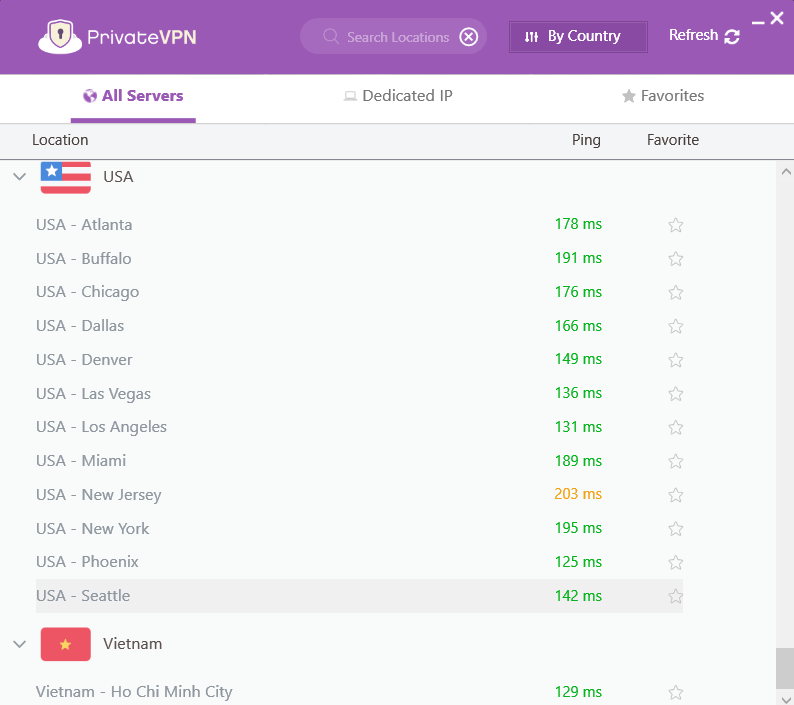
PrivateVPN lists all of its servers with the current ping from your home location so it’s easy to choose the best server.
Sam Singleton
Click on the location tile, and you can choose from a list of PrivateVPN’s more than 200 servers across 63 different countries. It also displays ping times next to each server location from your home computer’s location. This is a simple, but effective way for users to find the best server to connect to in any country.
If you’re a basic VPN user, that’s about all you need to know to use PrivateVPN. Those who want more control over their connections, however, can click the Advanced View button to see more options.
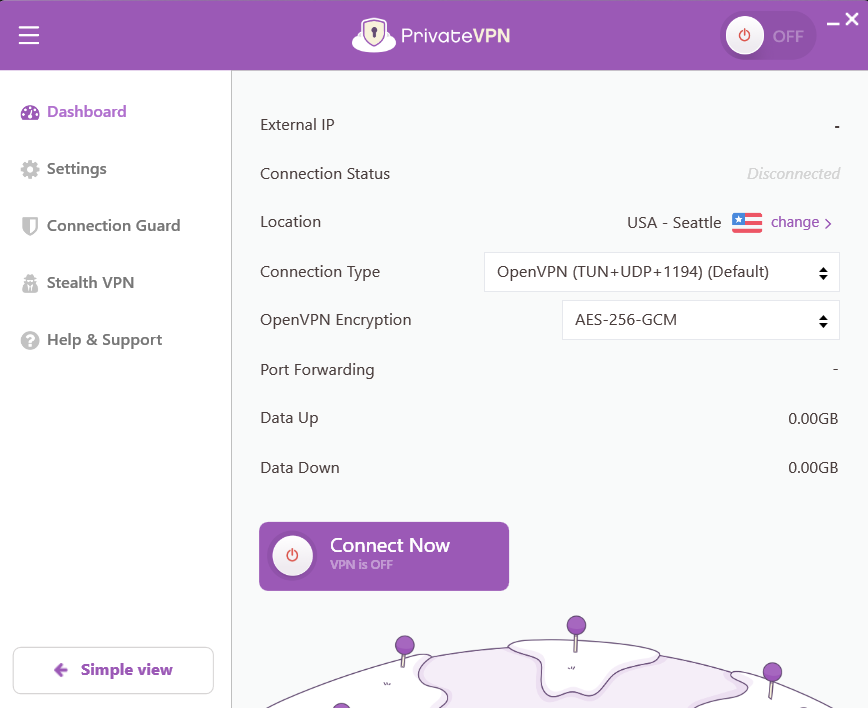
PrivateVPN’s Advanced View window.
Sam Singleton
Here you’ll be able to specify the VPN protocol you wish to use, as well as the level of encryption. Information such as Data Up and Data Down for how much data you’re uploading or downloading over a connection is displayed as well.
In the Settings menu available under the Advanced view, you have basic options such as booting the VPN on system startup, and language choices.
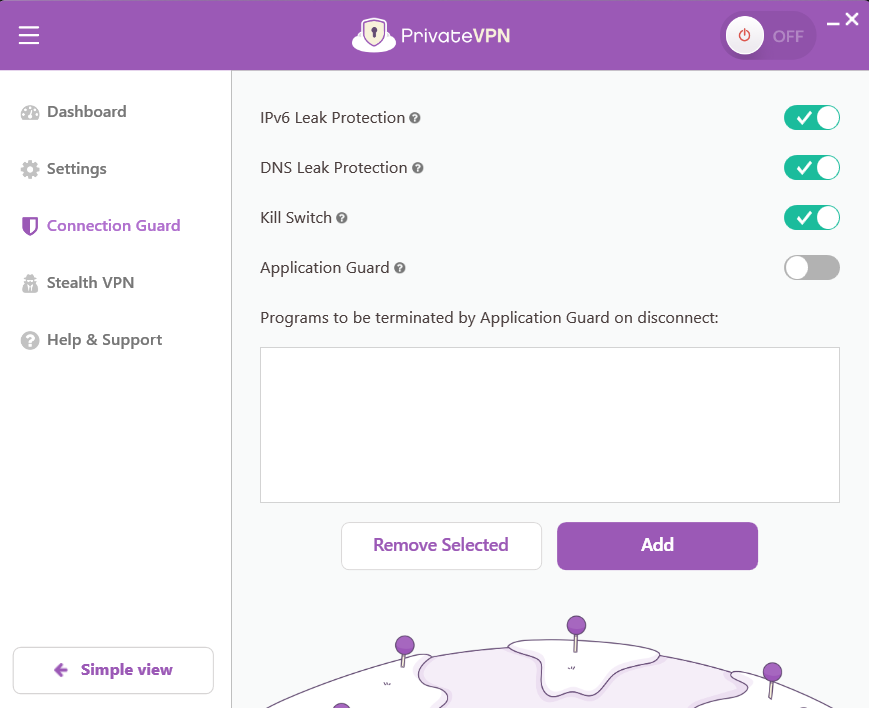
PrivateVPN’s Connection Guard allows you to control leak protections and kill switches.
Sam Singleton
Connection Guard houses options such as IPv6 and DNS leak protection and an internet kill switch, all of which are enabled by default. PrivateVPN takes the kill switch feature one step further by allowing users to designate certain apps to terminate should the connection drop rather than just the whole internet connection.
It also provides a Stealth VPN setting for getting around VPN blockers and DPI (deep packet inspection) firewalls. If you find that you aren’t getting through with the regular VPN connection, you can opt for this feature and specify different ports to find something that works — very useful when connecting to VPN-unfriendly countries.
There is a solid foundation here for a great VPN, but I can’t help but feel that PrivateVPN has stagnated. Most of these features were introduced years ago and it hasn’t added much in the meantime. Features such as split-tunneling and multi-hop are sorely missing and support for more advanced protocols such as WireGuard are long overdue.
PrivateVPN currently offers app support for Windows, macOS, Android, and iOS.
How much does PrivateVPN cost?
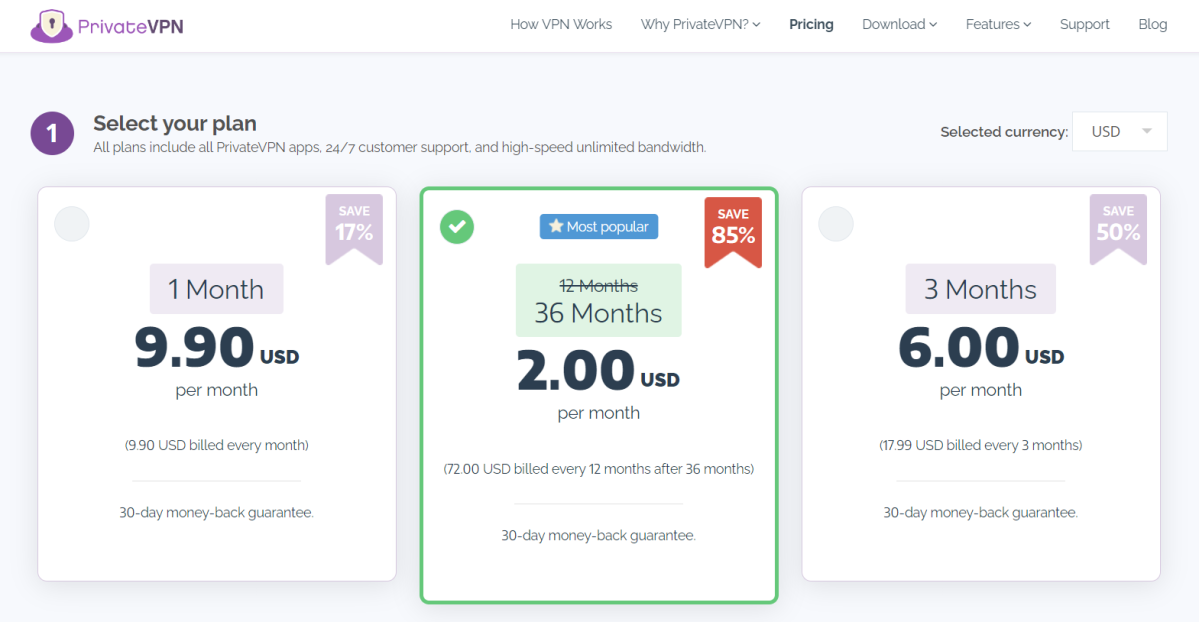
The lack of a middle-term subscription plan for PrivateVPN feels like a mistake.
Sam Singleton
PrivateVPN’s pricing is very reasonable compared to the industry average. Month-by-month rates are $9.99 and a three-year subscription is only $72 — an extremely affordable $2 per month.
This is where the pricing strikes me as rather odd. PrivateVPN only offers options for one month, three months, or three years. Most VPNs offer one- or even two-year long-term subscription options. In this day and age, brand loyalty only takes you so far, and to expect users to commit to three years strikes me as unrealistic. Regardless, the monthly pricing, should you opt for it, is still cheaper than many competitors.
PrivateVPN only offers options for one month, three months, or three years.
How is PrivateVPN’s performance?
When testing PrivateVPN’s speeds I measured connection speeds across its servers in six different countries around the world and then compared them to my baseline internet speed.
The average download speeds were 37 percent, which is pretty run-of-the-mill across all VPNs. Its upload speeds were much better, clocking in at 65 percent of the baseline. That makes PrivateVPN a decent, if unremarkable choice for browsing and torrenting, but a great choice for professionals who need to do video chats or upload and share documents.
On the streaming front, PrivateVPN succeeded in unblocking all major streaming services. Netflix, the service with the strongest anti-VPN countermeasures, loaded without a hitch across every PrivateVPN server I tried.
Be wary though, as its smaller server network may mean you’re out of luck in certain countries while traveling. That being said, it’s certainly a good choice for those who need a VPN to access geo-restricted content.
How is PrivateVPN’s security and privacy?
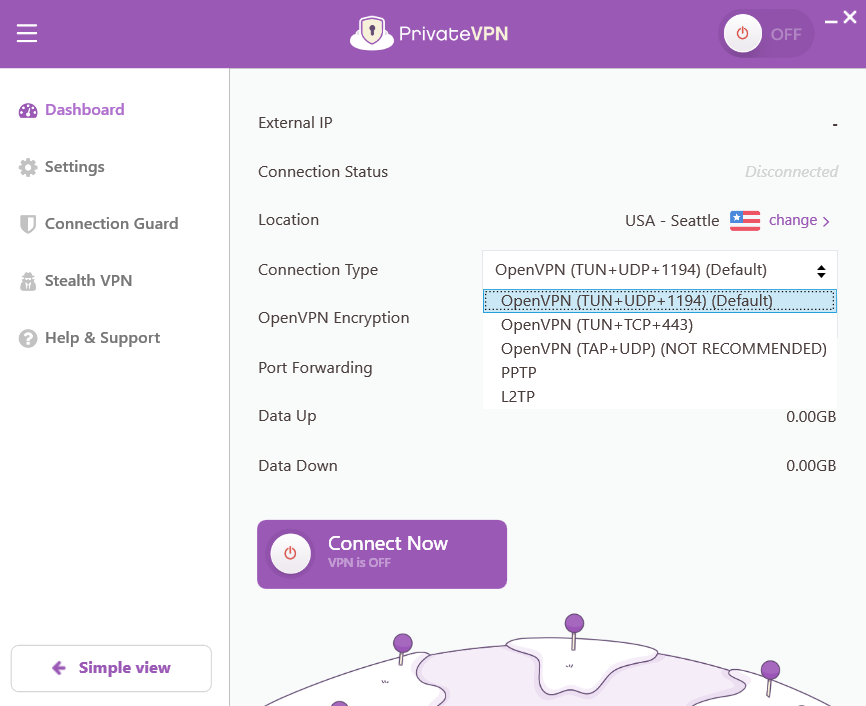
PrivateVPN allows you to choose your protocol when connecting, but unfortunately lacks WireGuard.
Sam Singleton
PrivateVPN comes with an unusual choice in protocols. It supports OpenVPN, PPTP, and L2TP, but does not support WireGuard. Users do have the option to set up WireGuard manually, but the fact that it isn’t included automatically is baffling. WireGuard is the latest VPN protocol and arguably offers the best in both security and speed.
It’s worth mentioning that PrivateVPN does also allow you to choose your OpenVPN encryption. I highly recommend that you mainly stick with AES-256-GCM as your encryption standard. Power users and IT professionals do have the option to change this though if they want to use a different encryption standard for various reasons.
PrivateVPN’s privacy policy states that it doesn’t track your web activity or any traffic while using the company’s VPN. It does, however, set cookies and track usage on its site — the cookies part is not surprising since you need that to log in to the site to access your account. To set up an account, the company requires an email address.
Payments are accepted via credit card, PayPal, and Bitcoin.
PrivateVPN is owned by PrivateVPN Global AB, which is based in Sweden. Since Sweden is a member of the 14 Eyes signals intelligence sharing alliance, PrivateVPN could be subject to mandatory government data sharing regulations — something to watch out for if privacy is your biggest concern.
Is PrivateVPN worth it?
PrivateVPN is a dependable choice in certain circumstances such as for Netflix access, ease of use, and video chatting with a VPN. The pricing is extremely affordable as well, even if there is no medium-length subscription plan.
The service is still good, but it’s losing ground quickly to its competitors. The foundation for a great VPN remains, but I have to assume that its lack of progress is down to funding issues. After all these years it still has a small server network and the absence of new features is somewhat discouraging.
Editor’s note: Because online services are often iterative, gaining new features and performance improvements over time, this review is subject to change in order to accurately reflect the current state of the service. Any changes to text or our final review verdict will be noted at the top of this article.




